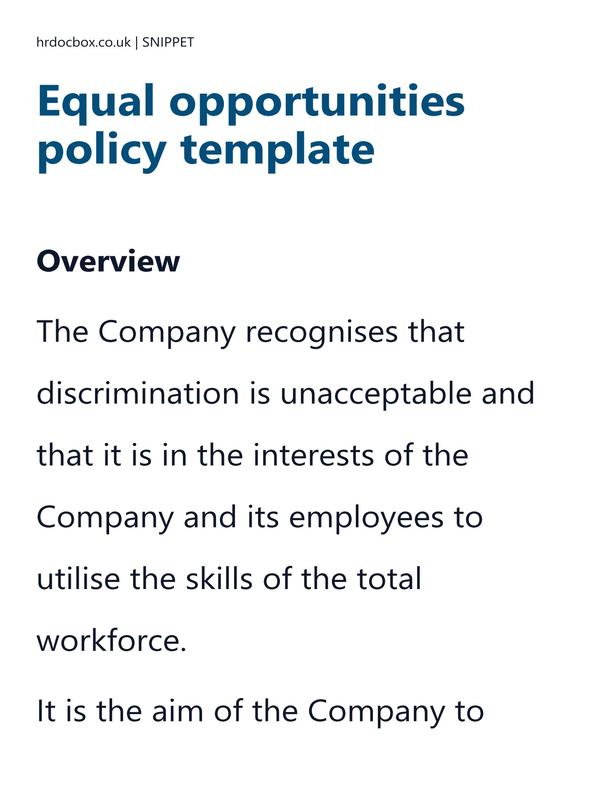Equal opportunities policy template


The Equal Opportunities Policy provides specific protection to the Company in respect of the Age Discrimination Regulations that came into force in October 2006.
This Policy follows ACAS guidelines to comply with the Age Discrimination Regulations, and fulfils requirements previously required by the Sex, Race and Disability Discrimination Acts and other relevant Regulations.
- Includes 12 months' access to the Equal opportunities policy template, with all updates provided free of charge and notified to you.
- UK-specific accuracy.
- 1,077 words over 3 pages.
- Last updated 05/01/2026.
- Format: Word / plain text / email.
- Delivery: Instant download after purchase (no physical item).
- Access: Download link shown here after checkout.
- This Equal opportunities policy template will SAVE you up to 2 hours drafting & research, save you money, and reduce your risk.
Equal opportunities policy
1 Overview
1.1 The Company recognises that discrimination is unacceptable and that it is in the interests of the Company and its employees to utilise the skills of the total workforce.
It is the aim of the Company to ensure that no employee or job applicant receives less favourable facilities or treatment on grounds of age, disability, sex, gender reassignment, pregnancy, maternity, race (which includes colour, nationality and ethnic or national origins), sexual orientation, religion or belief, or because someone is married or in a civil partnership. These are known as "protected characteristics". The Company wishes to see its workforce broadly reflecting the community in which its
This is a 10% preview of the Equal opportunities policy template. For instant full access, purchase this item or a parent bundle.
Equal opportunities policy template purpose
The purpose of an equal opportunities policy is to ensure that all employees and job applicants are treated fairly and without discrimination, regardless of their age, gender, race, ethnicity, religion or belief, disability, sexual orientation, or any other protected characteristic.
The main objectives of an equal opportunities policy are:
-
To eliminate discrimination: The policy aims to eliminate any form of discrimination in recruitment, promotion, training, or any other aspect of employment.
-
To promote diversity: The policy seeks to promote diversity in the workplace by encouraging applications from underrepresented groups and creating a welcoming and inclusive work environment.
-
To comply with the law: The policy ensures that the employer complies with relevant anti-discrimination legislation, such as the Equality Act 2010 in the UK.
-
To promote fairness and inclusion: The policy aims to create a fair and inclusive workplace where all employees feel valued and respected.
-
To prevent harassment and bullying: The policy sets out a zero-tolerance approach to harassment and bullying, and provides guidance on how to report and address such behavior.
An equal opportunities policy is an important tool in promoting diversity and creating an inclusive workplace culture. It helps to prevent discrimination and ensures that all employees have the opportunity to reach their full potential, regardless of their background or personal characteristics.
Practical application of a Equal opportunities policy template
- Issue the Equal opportunities policy template during onboarding / after changes / planned refresher.
- Send it to appropriate internal recipients such as employees, workers, contractors etc. and request confirmation that is has been read and understood.
Compliance
Compliance
This Equal opportunities policy template incorporates relevant UK laws and HR standards, including those listed below:
-
Equality Act 2010: This legislation requires employers to eliminate discrimination, harassment, and victimisation, and to promote equal opportunities in recruitment, training, promotion, and other aspects of employment.
-
Human Rights Act 1998: This legislation incorporates the European Convention on Human Rights into UK law, and protects employees from discrimination and other human rights violations.
-
The Public Sector Equality Duty (PSED): This duty requires public sector organisations, including some employers, to eliminate discrimination, advance equality of opportunity, and foster good relations between different groups.
-
The Gender Pay Gap Regulations 2017: These regulations require certain employers to report on their gender pay gap and take action to address any disparities.
-
The Disability Discrimination Act 1995: This legislation requires employers to make reasonable adjustments to support employees with disabilities and to prevent discrimination against them.
-
The Race Relations Act 1976: This legislation makes it unlawful to discriminate against employees on the grounds of race or ethnic origin, and requires employers to promote equal opportunities and good relations between different racial groups.
-
The Equality Act 2010 (Gender Reassignment) Regulations 2021: These regulations require employers to take steps to support transgender employees and to prevent discrimination against them.
-
The Age Discrimination Regulations 2006: These regulations prohibit discrimination on the grounds of age in employment, training, and other areas, and require employers to promote age equality.
It is important for employers to understand and comply with these and other relevant employment legislations when implementing an equal opportunities policy to ensure that their policies and practices are in line with the law and promote equality and diversity in the workplace.
Frequently Asked Questions about a Equal opportunities policy template
Frequently Asked Questions about a Equal opportunities policy template
-
Can I use the Equal opportunities policy template in my small business?
Yes. The Equal opportunities policy template is designed to be flexible and suitable for organisations of all sizes, including small businesses and charities. It follows UK employment law best practice, so even if you don't have an in-house HR team, you can confidently apply it.
-
Is the Equal opportunities policy template compliant with 2026 UK employment law?
Absolutely. Like the Equal opportunities policy template, all of our templates are drafted with the latest ACAS guidance and UK employment legislation in mind. We review and update them regularly, so you can be confident they remain compliant.
-
Can I customise the Equal opportunities policy template for my organisation?
Yes, we highlight the areas of the Equal opportunities policy template that you need to update with your own details, and where you need to make decisions to suit your situation. This saves you time and ensures that you meet best practice.
-
Do I get instant access to the Equal opportunities policy template?
Yes. Once purchased, you'll be able to download the Equal opportunities policy template instantly. Templates are provided in editable Word or Excel format so you can customise them easily, and in PDF format for easy sharing.
-
What if I need more help, not just a Equal opportunities policy template?
If you're looking for broader support, we also offer toolkits and library bundles that include the Equal opportunities policy template, along with other HR templates and policies for fully managing your situation. These may be more cost-effective if you need deeper advice.
-
Why should I use this Equal opportunities policy template, and not AI to generate it?
The risk of using a free AI-generated template 'without review' includes your legal exposure, missing context, and no awareness of the wider process, whereas purchasing the Equal opportunities policy template from us mitigates that risk.
